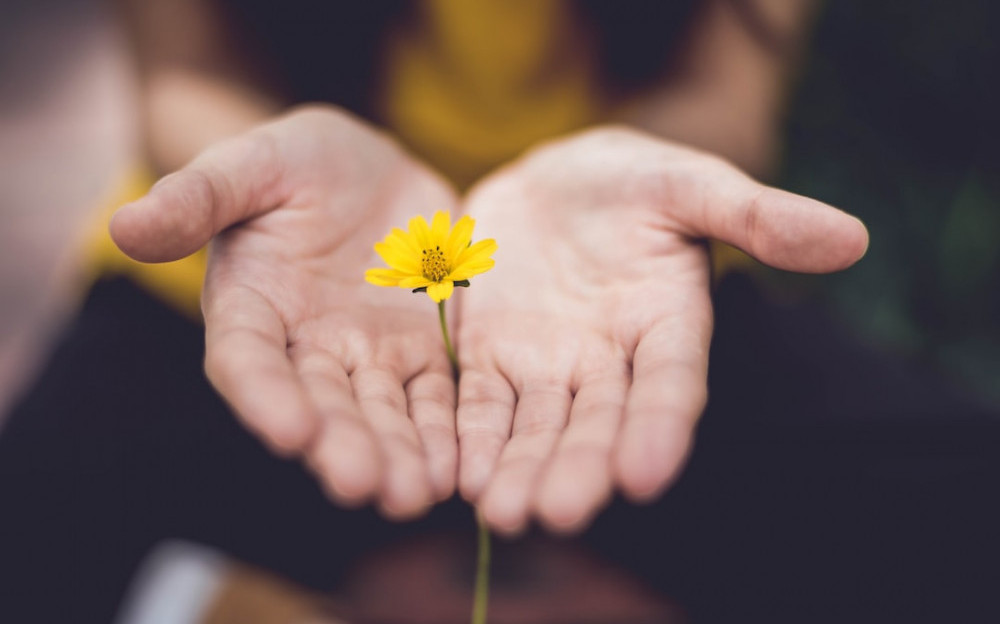Hi, today I want to talk about one of my all-time favorite habits!It has truly transformed my life, and the best part is that it’s free (well, aside from the cost of a pen and a notebook, but it’s worth having a special notebook for this, not just any regular type of your homework notebook – more on that later)
For those who are not journaling, at least a few times a week, you are all missing out!!
And in this post I will tell you all the reasons why , and how to start journal writing from today, even if you are a lazy, no motivated person (like me), and even if you hate writing. Journaling isn’t like writing a book; it’s something anyone can do and excel at.
So, let’s get started

How to Start Journal Writing
Different types of journal writing
If you think journaling is only about recording the events in your life, then that’s just scratching the surface of the entire concept of journal writing.
There is much more to it than that. Here, I will list a few different methods of journaling that I have used and found very beneficial for me (and yes, there are many more types beyond this list).
Personal Journaling
First, perhaps the most popular form of journal writing is writing about your life. It ‘s about keeping personal journals to document your daily memorable events and express your thoughts and emotions.

To me, It’s all about gaining clarity on what’s going on in my head and in my life.
Additionally, personal journaling serves as a means to archive my past memories, allowing me to revisit them in the future, finding them amusing, or even extracting valuable life lessons.
A little of my story here..
I really started with personal writing when the pandemic hit. At the time, I was studying in Vancouver, Canada, which is far away from my home country and of course my family.
When the pandemic hit, I simply couldn’t go out. We had online classes, and we stayed at home. I basically had no one to talk to. That’s when journaling really did help me a lot.
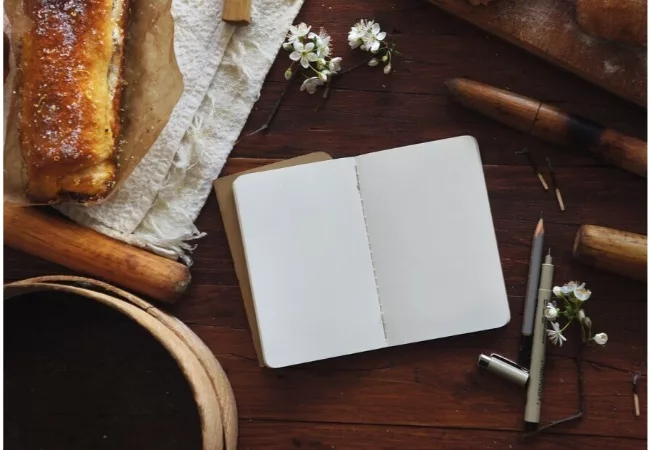
It wasn’t just a way for me to understand myself better (yes, because I had nothing else to do), but it was incredibly effective in helping me cope with my loneliness at the time.
Writing in my diary made me feel like I had someone to talk to, even though I was actually just talking to myself.
Creative writing
It’s when you use journaling as a creative outlet, experimenting with poetry, short stories, or essays within the pages of your journal. This can be especially helpful if you work or study in a field that requires creativity, or even if you’re just a regular person, some extra boost of creativity won’t hurt you.
Doing creative writing through journaling definitely helps your brain become more creative, which is a significant advantage that can benefit you in many aspects of life.
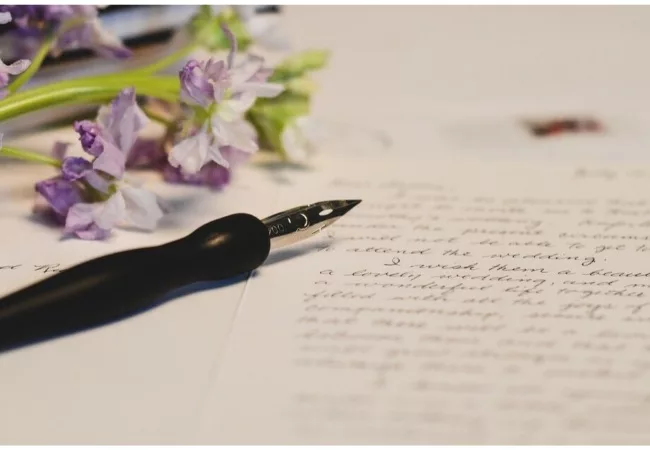
To me, creative writing helps me explore my creativity in a private, non-judgmental place. It serves as a record of creative growth, with ideas born within its pages often evolving into larger projects.
As someone who writes blogs, journaling aids in the development of my personal writing style as many writers indeed discover their writing styles through creative writing from their journaling.
Therapeutic Journaling
The practice of self-compassion is integral to therapeutic journaling. You learn to treat yourself with kindness and understanding, even when facing challenges or setbacks.
One of the most popular forms of therapeutic journaling is probably the gratitude journal. This practice involves regularly writing down things that you are grateful for, even for the smallest things. This really helps you shift your focus towards positivity.
In the study “A Brief Gratitude Writing Intervention Decreased Stress and Negative Affect During the COVID-19 Pandemic,” they tested the effectiveness of gratitude journaling, regular expressive writing, and doing nothing in reducing stress.
The results show that people who did gratitude writing continued to feel grateful even after they stopped, whereas those in the control and expressive writing groups experienced a decrease in their sense of gratitude over time.
Participants in the gratitude writing condition demonstrated significant reductions in stress one month after the intervention, while participants in the control and expressive writing groups showed no changes in stress over time. The study concluded that a simple practice of writing down a few things you are grateful for each day was effective in reducing participants’ stress and negative affect.

In another research study conducted by Booker and Dunsmore in 2017 (titled “Expressive writing and well-being during the transition to college: Comparison of emotion-disclosing and gratitude-focused writing” in the Journal of Social and Clinical Psychology), it was found that, when compared to a control group, both gratitude writing and expressive writing significantly increased students’ feelings of life satisfaction over time.
Even more interesting, participants in the gratitude writing group showed a clear trend of experiencing fewer depressive symptoms even more than the expressive writing and control groups.
Work or Professional Journal
Professionals and researchers find journals super handy for many reasons.
You can use them to note down interesting ideas, document your research experiences, monitor project progress, establish personal goals, stimulate your creative thinking, address issues, create diagrams to clarify concepts, store valuable information, record meetings and significant dates, or simply jot down daily notes to connect with your inner thoughts.
These are the types I have been using so far!
How to start journal writing
Determine the purpose of your journaling
As I mentioned earlier, there are various types of journaling, each serving a unique purpose. It’s important to figure out what you want from your journaling.
Personally, I’ve found that using journal prompts is a great way to kickstart my journaling. These prompts are like specific questions or topics that get your writing going. They are often used to overcome writer’s block, ignite creativity, or concentrate on particular themes or areas of self-reflection.
Journal prompts could be something like this:
- Gratitude Journaling:
- What are three things you’re grateful for today?
- Write about a person who has positively impacted your life and why you appreciate them.
- Describe a memorable act of kindness you’ve experienced or witnessed recently.
- Self-Reflection:
- What is a personal quality or trait you’d like to improve, and how do you plan to work on it?
- Write about a recent challenge you faced and the lessons you learned from it.
- Reflect on a moment in your life when you felt most proud of yourself and what led to that achievement.
- Creative Writing:
- Begin a short story with the sentence, “It was a dark and stormy night…”
- Write a letter from the perspective of a fictional character describing their day.
- Create a poem inspired by a color, emotion, or a favorite place.
- Goals and Aspirations:
- List three short-term and three long-term goals you want to achieve in the next year.
- Write about a dream or ambition you’ve always had and what steps you can take to move closer to realizing it.
- Explore your vision of an ideal future, considering your career, relationships, and personal growth.
- Memories and Reflections:
- Recall a cherished childhood memory and describe it in detail, including sights, sounds, and emotions.
- Write a letter to your future self, discussing your current goals, fears, and hopes.
- Explore a significant life event that has shaped who you are today and the impact it had on your journey.
- Random Inspiration:
- Pick a random word from a book or magazine and write about it for a few paragraphs.
- Create a list of 10 things that make you smile and elaborate on each one.
- Write about an interesting observation or conversation you had today.
The journal prompts jar
I like to make a jar where I keep my journal prompts written on pieces of paper. Some days, I prefer to journal from what is on my mind at the moment, but on other days, I like to pick a prompt from the jar and write about whatever I draw.
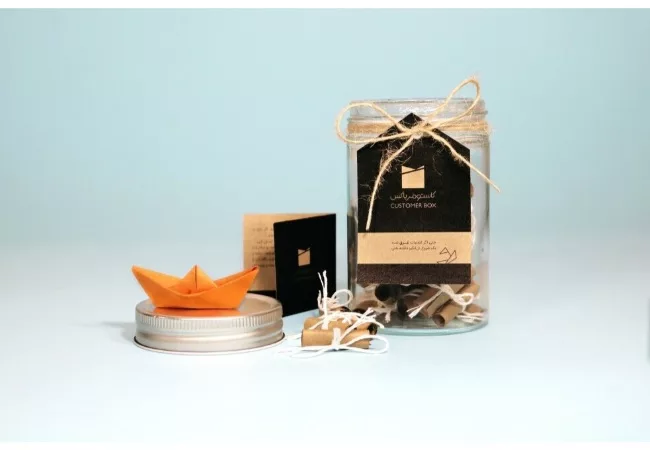
This practice helps exercise my brain and inspires me to contemplate ideas and topics that I might usually overlook or not not give much thought to.
Get a special notebook
One tip is to use a special notebook for your journaling. This can make the whole journaling experience more enjoyable and inspire you to journal more often.
It doesn’t have to be an expensive or store-bought notebook; you can simply grab a regular one and add your personal touch to it. You can use stickers, drawings, or write on the cover, and even add a photo of yourself or your favorite things.
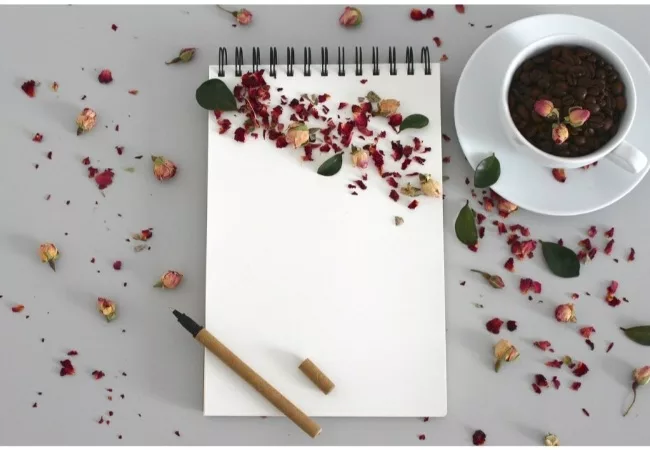
A special notebook helps your brain associate journaling with joy and happiness, making your journaling experience even more special in itself.
Start small, low expectations
One tip for starting with journaling is to begin small. Don’t try to write long, profound entries right from the start.
In fact, it’s a good idea to write less at first and even stop before you finish all your thoughts on paper. This will leave you wanting to return to your diary the next day to continue where you left off. It might sound counterintuitive, but it’s an excellent tip for beginners to build the habit of journal writing.
Additionally, your journal doesn’t have to be deep and meaningful all the time. It’s a reflection of you, and you are a mix of different emotions – sometimes silly, happy, sad, or even just feeling nothing.
So just be free and write about whatever you feel like at the moment.
Make Journaling a routine
Make journaling a routine: do it before bed or right after waking up.
One practice I find effective is creating a list of three positive decisions to kickstart my day. Here’s an example of what my list might look like:
- Drink 2 liters of water.
- Complete my essays.
- Do a 25-minute workout.
You notice the words “3 good decisions to make” make me feel really motivated to accomplish those good things in days but also don’t put on so much pressure that I feel like I have to do it.
You know when there’s too much pressure and you feel like you are forced to do something, you just end up not doing it eventually (well, at least it’s the case for me). So, this is a really effective way in helping me get over my laziness and procrastination.
Be consistent for the first 20 days
They say it takes at least 20 days to establish a habit, and the same goes for journaling.
As I mentioned earlier, you don’t need to write extensively in the first stage, but you should write something. Even on days when you feel a bit lazy, just jot down a few sentences to keep the momentum going and build a habit for yourself. With time, it will become more natural.

You can also journal with a friend and keep each other accountable in forming this habit. This can boost your motivation and make journaling even more enjoyable.
When You’re More Advanced: Separating Daily and Deep Journaling
This is only for when you are already more advanced and feel the need to make your journaling more organized and easier to keep track of later. You might find it beneficial to separate your daily journal and your deep thought journal.
Daily journaling involves writing in your journal every day, often as a regular routine.
It serves as a means to capture the present moment and maintain a record of your daily life. Daily journaling helps you process daily challenges, celebrate achievements, and track your progress over time.
Deep thought journaling, on the other hand, is less frequent and more focused. It encourages you to delve into your inner world and contemplate broader life themes.
This form of journaling is a valuable tool for personal development, goal planning, and making sense of complex emotions and experiences. And journaling prompts often go great with this type of journaling.
Final Words
In conclusion, journaling is a powerful practice that offers a multitude of benefits for individuals seeking self-expression, self-reflection, and personal growth.
Whether you’re documenting daily life, exploring creativity, or delving into profound introspection, the act of putting pen to paper or fingers to keyboard can be a transformative journey. I hope you start your journal writing today and let me know in the comments your tips on how to start journal writing




